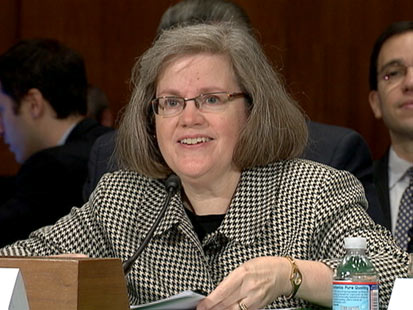For-Profit Colleges Target Military Personnel, Market High-Interest Private Loans

Image Credit: ABC
ABC News’ Amy Bingham and Tom Shine report:
America’s students are in debt, $1 trillion in debt in fact. But while most college graduates struggle to repay loans with less than 10 percent interest, some military personnel are drowning under significantly more expensive loans.
Holly Petraeus, CIA Director David Petraeus’s wife and an advocate for military families, told a Senate panel today that for-profit colleges are actively targeting military personnel and their families, marketing loans with interest as high as 584 percent APR.
“There are some real concerns, there is real aggressive marketing right now to the military and not just to military members, but to their spouses and to their children as well,” Petraeus said.
To pay for the pricey private schools, these colleges often market “expensive private student loans” to service members who, as a group, tend to already have more debt that the average American, said Petraeus, who is working with the newly-formed Consumer Financial Protection Bureau to protect military families from such predatory loans.
Petreaus said she spoke with an Army wife at Ft. Campbell in Kentucky who had enrolled in an online course through a college she thought was officially associated with the military. She said representatives from the school, which actually had no military affiliation, called her a dozen times per day until she agreed to register.
But help was nowhere to be found once the school received her tuition payment. The woman ended up failing her course because she had trouble logging on, Petraeus said.
“I have a real interest in folks being able to make more informed decisions than, ‘Well, they sounded military friendly and they called me 10 to 15 times per day,” she told the Senate committee. ”There are serious questions about whether the education you get at many of these institutions justifies their high cost.”
While meeting with service members around the country, Petraeus said she also heard horror stories of loan companies charging crippling interest rates. One internet lender, she said, tells service members who visit their site: “We believe that your membership in the armed forces entitles you to special treatment. We speak your language!” That language includes an interest rate on their loans of nearly 600 percent APR.
And when the vets fall behind in their payments, harassing debt collectors take over.
“They may call a service member’s home and unit 20 or 30 times a day, threaten them with the uniform code of military justice, and tell them they’ll get them busted in rank or have their security clearance revoked if they don’t pay up,” Petreaus said. “We’ve even heard of a debt collector harassing a surviving spouse of a service member killed in action, insisting that she had to use the money from his death gratuity to pay off a debt immediately.”
College costs aside, many military members are in debt before they even enlist. Petreaus said that on a recent trip to Texas, “We were told that the average Air Force recruit arrives at Lackland Air Force Base for basic training over $10,000 in debt.”
“A continuing issue for the military is the general issue of indebtedness,” Petraeus said. ”Unfortunately there are still too many young troops learning about wise spending through hard experience and years of paying off expensive debt.”